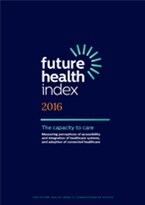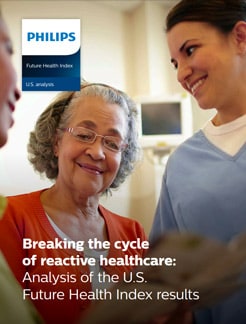Is the US ready for
integrated healthcare?
According to the 2016 Future Health Index, three quarters of healthcare professionals surveyed in the US believe that an integrated healthcare system is important, yet only about half of them (52%) see US healthcare as somewhat integrated today. The US ranked 6th out of 13 countries surveyed for the Future Health Index. While the U.S. scores just above average on healthcare access and connected care device adoption, it falls below the average on healthcare integration, indicating that U.S. is missing opportunities to realize the full benefits of ‘connected care’ technology when they are powering integrated health.
Voices from around the globe
The Future Health Index, an international research report commissioned by Philips, explores how countries around the world are positioned to meet global health challenges by leveraging integration and connected care technologies. In early 2016, more than 2,600 healthcare professionals and 25,000 patients were questioned across 13 countries. Results point to a clear perception gap when it comes to accountability and capability for preventing poor health.
Gauging the ‘capacity to care’
One of the greatest achievements of 21st century medicine is that Americans have an average life expectancy of 80 years. While we should relish the achievement of extending the life span for most residents of the United States, we now face a pressing challenge for the twenty-first century: How do we ensure we not only live longer but also live well? How do we harness technology to produce health, not just treat illness?
Insights:
Data is proliferating, but data sharing continues to be a challenge. Medical information often struggles to flow around health systems in many markets, stifling efforts to develop integrated care.
Measuring perceptions
The actual Future Health Index is based on survey questions related to three important indices: Ranging from 0 to 100 points, the index is calculated (per country) by combining the quantitative survey responses from both patients and healthcare professionals. A higher score indicates positive views on the state integration. United Arab Emirates ranks highest (65.3), Japan lowest (49.0). The report yields valuable insights to identify areas of focus to help achieve a better long-term future for healthcare through health technology.
What insight will you find most useful?
Get your complimentary report today. One interesting study outcome suggests that developed markets score better in terms of healthcare access, while emerging markets are blazing a trail for technology adoption.



